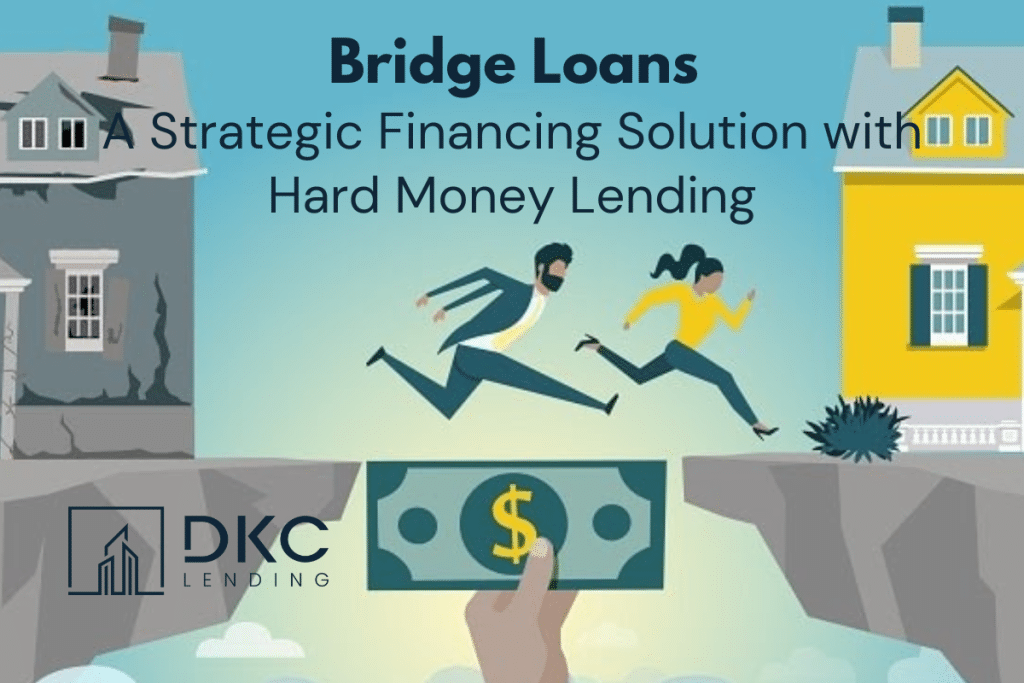In real estate investing, timing is everything. Investors often encounter situations where they need to secure a property before selling another or require immediate financing to close a deal while waiting for long-term funding. Bridge loans provide a short-term financial solution that helps investors navigate these transitional periods without missing out on profitable opportunities.
Traditional lenders often struggle to provide bridge financing due to their lengthy approval processes and rigid requirements. Hard money bridge loans offer a faster, more accessible alternative, allowing investors to move quickly and confidently in a competitive market.
Hard money bridge loans enable investors to secure properties, reposition assets, and transition to permanent financing without unnecessary delays. By leveraging this flexible funding solution, real estate investors can maximize opportunities and maintain steady momentum in their portfolios.
Challenges in Securing Traditional Bridge Loans
Slow approval and funding process. Conventional lenders take weeks or months to approve bridge loans, requiring extensive documentation, credit checks, and income verification. These delays can cause investors to lose out on deals that require fast action.
Strict borrower qualifications. Traditional bridge loans often require strong credit, substantial income documentation, and a low debt-to-income ratio. Many investors struggle to meet these criteria, particularly those with unconventional income sources.
Limited loan options for investment properties. Many banks and institutional lenders focus their bridge loan programs on owner-occupied homes rather than residential investment properties. This limitation forces investors to seek alternative financing solutions.
Unreliable funding for distressed or transitional properties. Conventional lenders tend to avoid funding properties that require renovations or have uncertain long-term financing plans. Investors needing bridge loans for distressed acquisitions often face roadblocks.
These challenges highlight the need for a more flexible and efficient approach—one that hard money lenders provide.
The Hard Money Lending Advantage for Bridge Loans
Fast funding to secure time-sensitive deals. Hard money bridge loans are designed for speed, with approvals and funding often completed within days. Fast funding allows investors to move quickly on properties that require immediate action.
Asset-based lending for greater accessibility. Hard money lenders prioritize the property’s value over the investor’s credit history, making financing available to a broader range of investors, including those with non-traditional income sources.
Flexible loan structures to align with investment goals. Hard money bridge loans can be structured with interest-only payments and short-term durations, helping investors manage cash flow while transitioning to permanent financing.
Financing for value-added opportunities. Investors can use bridge loans to acquire and renovate distressed properties, increasing their value before refinancing into a long-term loan or selling for a profit.
A seamless transition to long-term financing. Hard money bridge loans act as a financial bridge, allowing investors to purchase or reposition properties while preparing for permanent funding.
By utilizing hard money bridge loans, investors gain the flexibility and speed needed to capitalize on real estate opportunities without being constrained by traditional lending obstacles.
Case Study: Leveraging a Hard Money Bridge Loan for a Profitable Investment
Camila, a seasoned real estate investor, had an opportunity to purchase a prime residential investment property in a competitive Florida market. She had a long-term financing option but needed immediate capital to secure the deal before another buyer stepped in.
When his bank informed him that the approval process for a bridge loan would take over a month, Camila turned to a hard money lender for a faster solution. Within a week, he secured a hard money bridge loan based on the property’s market value.
With the loan in place, Camila could close on the property quickly. A few months later, after completing light renovations and securing a long-term mortgage, he refinanced the bridge loan and locked in lower-rate permanent financing. Camila would have lost out on the opportunity without a hard money bridge loan.
Strategic Benefits of Hard Money Bridge Loans
Eliminating financing gaps. Investors can use bridge loans to cover temporary funding shortfalls, ensuring they never miss out on a valuable investment due to delays in securing long-term financing.
Strengthening competitive advantage. Buyers who can provide fast, cash-like offers stand out in competitive real estate markets. Hard money bridge loans allow investors to close quickly, improving their negotiation position.
Unlocking equity for reinvestment. Investors with equity tied up in existing properties can use hard money bridge loans to access capital for new acquisitions without selling their assets prematurely.
Providing short-term capital for renovations. Hard money bridge loans give investors the funds needed to improve properties before securing permanent financing or selling for a higher profit.
Supporting portfolio expansion. Investors can scale their real estate holdings by using bridge loans to transition from one investment to the next, maximizing cash flow and market opportunities.
These advantages make hard money bridge loans a strategic financing tool for investors looking to maintain momentum and capitalize on evolving real estate opportunities.
Key Considerations When Using Hard Money Bridge Loans
Understanding loan costs. While bridge loans typically have higher interest rates than conventional loans, investors should ensure that the property’s potential appreciation, rental income, or refinancing plan justifies the cost.
Having a clear exit strategy. Since bridge loans are short-term, investors must have a well-defined plan to transition into long-term financing or sell the property before the loan matures.
Evaluating market conditions. Investors should assess market trends, rental demand, and resale potential to ensure their investment strategy aligns with their bridge loan terms.
Selecting a reputable lender. Partnering with an experienced hard money lender ensures transparency, fair loan terms, and efficient processing, reducing risk and enhancing investment success.
By carefully planning and selecting the right lending partner, investors can use hard money bridge loans to streamline transactions and maximize profitability.
Best Practices for Success with Hard Money Bridge Loans
Act quickly on high-potential deals. Investors should be prepared to move fast when an opportunity arises, leveraging bridge loans to gain a competitive edge.
Maintain financial flexibility. Proper budgeting and cash flow management ensure investors can handle short-term loan obligations while transitioning to permanent financing.
Work with a reliable real estate team. A strong network of lenders, agents, and contractors can help investors execute their strategies efficiently and profitably.
Stay informed about refinancing options. Monitoring interest rates and mortgage programs allows investors to transition smoothly from bridge loans to permanent financing when right.
Following these best practices enables investors to maximize the value of hard money bridge loans while minimizing risks.
Conclusion
Bridge loans play a vital role in real estate investing, helping investors transition between transactions, secure properties quickly, and unlock capital for new opportunities. Traditional lenders often fail to meet real estate investors’ speed and flexibility requirements, making hard money bridge loans the preferred solution for those looking to stay ahead in a competitive market.
By leveraging hard money lending, investors can close deals without delay, reposition properties, and move seamlessly into long-term financing. For investors seeking fast, reliable, and flexible bridge loan solutions, DKC Lending provides expert guidance, competitive loan structures, and the funding needed to turn short-term financing challenges into profitable investment opportunities. With the right financing partner, investors can maintain momentum, expand their portfolios, and achieve long-term success in residential real estate.


